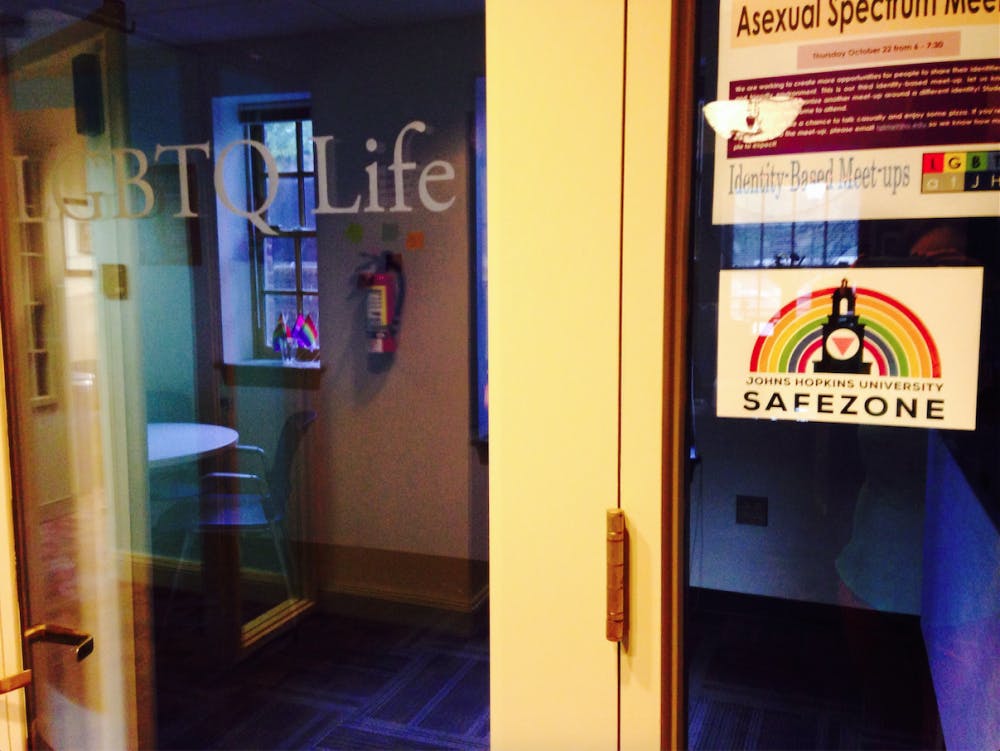By SABRINA CHEN For The News-Letter
The Safe Zone program run by LGBTQ Life at Hopkins aims to train students, staff and faculty to become better allies with the LGBTQ community. In the two years since the program was founded, over 600 members of the Hopkins community have been trained.
Director of LGBTQ Life Demere Woolway said that the Safe Zone program is not unique to Hopkins. Many universities and K-12 schools around the country have their own versions of Safe Zone or Safe Space programs.
“The basic model is that you have individuals who are trained so they go through a small piece of education and, at the end of the time, they are empowered to shape the space they work in and make campuses or wherever they work more inclusive for LGBTQ folks,” Woolway said.
She added that anyone at Hopkins is invited to attend one of the three-hour training sessions hosted throughout the year.
People can sign up through email at the Office of LGBTQ Life. Woolway added that she also does training sessions at the request of a Hopkins departments or groups on campus.
“The trainings themselves usually have between six to 30 participants because with a group any larger, you can’t get that small group interaction. I go to all of the trainings, but I have a cohort of facilitators who participate in leading them,” Woolway said.
The training consists of two parts: one explains how to use appropriate LGBTQ terminology while the second half covers how one can support the LGBTQ community.
“One of the things I’ve found is that people often want to know about language and how to respect the community by using the right words. We talk about scenarios, about responding to problematic language and acknowledging your own process,” she said.
Senior Amy Sun, who was trained in Safe Zone through a special program for students in the Student Government Association (SGA), said that the training was effective because of its emphasis on interactive learning.
“The training covered the process of coming out and understanding what sexual and gender identities are and how to take action on our campuses or at clubs and parties. We learned while acting out the part. Someone would be acting out passed out at a bar and someone else would be the bystander. It was very helpful and more beneficial than an online experience,” she said.
Similarly, junior Christianne Bharath, an intern at LGBTQ Life, said that the program was beneficial not only for students but also for staff and faculty. Generally speaking, the groups being trained are a mixture of professors, graduate students and undergraduates.
“It’s a really excellent education opportunity for professors and staff here on campus because it helps students feel a lot more comfortable knowing that their professors are Safe Zone trained. Professors can show their support by putting the LGBTQ sticker on the door of their offices,” she said.
Bharath added that as an intern at Center for LGBTQ life, she is in charge of reviewing the evaluation forms for Safe Zone training. She said that the program generally receives very positive feedback from participants.
“It’s really important that people know that we do take into consideration what they say and their feedback on the training. It’s a very special program to us in the office. We type up everyone’s evaluation, and we read them to see how they think the training can be improved because we are always looking for ways to improve,” she said.
Hopkins graduate Alexandra Colt, who attended the first-ever Safe Zone training in December 2013, said that she is glad to see the program grow throughout the years. She added that it is very non-judgmental and is excellent for people who are curious about the LGBTQ community and want to find an easy way to get involved.
“It’s a great place for everyone to come to gain exposure to the community, regardless of your background. It’s a nice reminder of how to treat people with an open mind and to use the right language so that we can create a safe and comfortable community for everybody,” she said.





